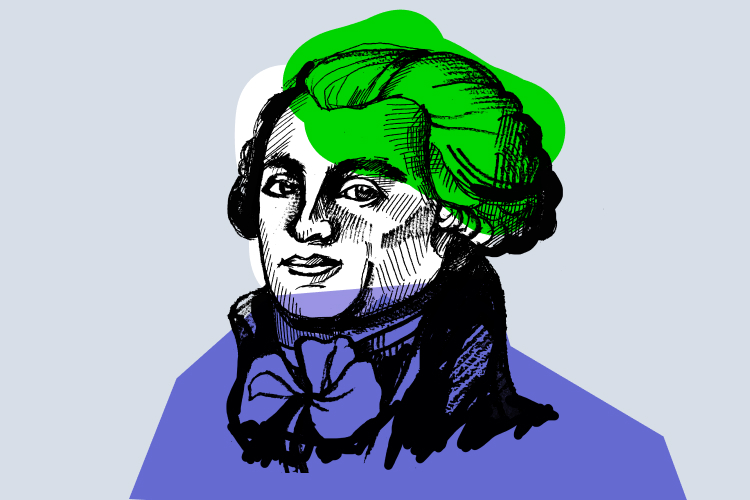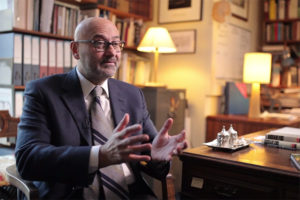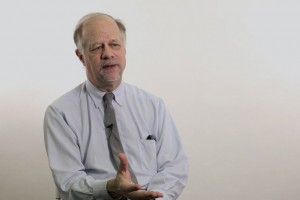Medieval Mapping
Historian Alessandro Scafi on the Medieval knowledge about spherical form of the Earth, compass points on medi...

Maximilien Robespierre (1758-1794) was a lawyer and, from 1789, an increasingly important and controversial political figure during the French Revolution. He was born in the Artois capital Arras on 6 May 1758, to a lawyer father and a mother who was the daughter of a brewer. Maximilien was conceived before their marriage. His mother died in childbirth in 1764, and his father left the four children in the care of relatives, who ensured that Maximilien received a strong education, especially in the classics, then in law. He won a scholarship to the College of Louis-le-Grand in Paris 1769-81, then returned to practice law in Arras. He was successful as a lawyer, although he often lived in modest circumstances.
The convocation of the Estates-General on 1 May 1789 changed his life. Robespierre was narrowly elected as a Third Estate deputy for Artois after a protracted and angry election period. He embraced the ‘patriot’ cause at Versailles and, after October 1789, in Paris as a member of the National Assembly. He spoke consistently and frequently on the need to follow the full implications of the principles of 1789. His great popularity by 1791 temporarily collapsed in early 1792 as he opposed the campaign for war with Austria and Prussia, but in the military and political crisis that followed, Robespierre was turned to as a member of the Committee of Public Safety empowered by the National Convention in the Year II (1793-94) to take emergency measures to save France, the Republic and the Revolution itself. The regime would subsequently be called ‘the Terror’.

The Committee, backed by most deputies in the Convention and a network of ‘patriot’ Jacobin clubs across the country, took sweeping measures of national mobilization and repression to secure victory over enemy soldiers and internal counter-revolutionaries. As republican armies became increasingly successful in May-June 1794, Robespierre and the Committee were unable to formulate a clear path to return to peacetime government. Increasing factional infighting, popular discontent, and Robespierre’s own mental and physical exhaustion made him vulnerable to charges of seeking personal power. On his return from a protracted period of absence from public life, an inept attack on his enemies within the Convention gave them the pretext to order his arrest. He was guillotined on 28 July 1794, aged 36 years.
Historians agree that Robespierre’s lifestyle was modest, even ascetic. He seems to have had little interest in food and drink, and his frugality during the Revolution became legendary. He always lived in modest circumstances, although taking care of his physical appearance: even at the height of the Revolution, when many fellow Jacobins adopted more relaxed, popular hairstyles and clothing, Robespierre continued to wear a powdered wig and bourgeois clothes, such as knee-breeches and stockings.
His imagined personality has inspired debate. The recent biography by Ruth Scurr described him as a ‘mediocre figure strutting and fretting on the historical stage’, narcissistic, and ‘remarkably odd’. Many have described him as physically repellent and emotionally cold, with no capacity for sexual intimacy. Others have understood him as a paranoiac who, at a time of generalized belief in the malevolent power of conspiracy, was consumed by the omnipresence of counterrevolutionary plots. It has been simple for psycho-biographers to infer that the tragic loss of his parents at age six in 1764 made him both emotionally stunted and rigid in his rules of virtuous behavior.

Certainly, Robespierre was a serious, reserved man with strongly held personal values. There is abundant evidence, however, that he gave and received affection, although we will never know why such emotions evidently did not result in a fully intimate relationship. The Duplay family, with whom he lived in 1791-94, was deeply fond of him, and it was assumed that he and their daughter Eléonore would one day marry. Robespierre’s childhood experiences seem to have formed in him strong views about the rights of children and the ideal values of marriage to inform his attitude to revolutionary reforms to property rights, education, and the family. These reforms were at the heart of the revolutionary project, and Robespierre brought to them values learned as a little boy and young man in a world in which his mother, in particular, then his sisters, aunts, and grandmothers were of unusual importance. Instead of the emotionally stunted, rigidly puritanical, and icily cruel monster commonly portrayed in history and literature, Robespierre was a passionate man.
Historians’ judgments have commonly been a function of their own political views and the context of their own times. While positive images of Robespierre were kept alive among radical Republicans in the first half of the nineteenth century, it was not until the 1860s that the first wholly positive biography appeared, a massive work by Ernest Hamel. A positive approach to Robespierre was at its peak in the first half of the twentieth century, particularly in the context of two world wars and the rise of fascism in Europe. In France, this rehabilitation was particularly the work of the left-wing historians Albert Mathiez, Gérard Walter, and Georges Lefebvre. For them, Robespierre personified the uncompromising realization of the principles of 1789 and the heroic defense of the Republic against counterrevolutionary Europe in 1792–94.

From an orthodox Marxist perspective in the 20th century, he was seen as the great savior of a bourgeois Revolution but – in contrast to Lenin – as doomed to failure because the peasantry and sans-culottes for whom he spoke had different and internally inconsistent class interests from the middle-class Jacobins. So, for Lefebvre’s successor at the Sorbonne, Albert Soboul, it was conflicting class interests that brought him down.
English biographers have generally been antipathetic toward him. Even the best English-language biography of Robespierre, written by the historian and theologian J.M. Thompson in 1935, concluded that, while he ‘will remain one of the great figures of history’, he had a ‘moral fanaticism which swept aside common human feelings.’
Maximilien Robespierre is one of the most controversial figures in history. How could it be that someone who articulated the highest principles of the French Revolution of 1789 could come to be seen as the personification of the ‘Reign of Terror’ in 1793–94? This is what we might call ‘the Robespierre problem’.
Was Robespierre the first modern dictator, inhuman, fanatical, and dictatorial, an obsessive who used his political power to try to impose his rigid ideal of a land of Spartan ‘virtue’? Or was he a principled, self-abnegating visionary, the great revolutionary martyr who succeeded in leading the French Revolution and the Republic to safety in the face of overwhelming military odds? Were the controls on individual liberties and the mass arrests and executions of the Year II (1793-94) the necessary price to pay to save the Revolution? Or was this year a time of horror, of unnecessary death, incarceration, and privation?
The most useful sources is the complete Oeuvres de Maximilien Robespierre, republished in 11 volumes for the Société des études Robespierristes in 2000-07. Of great importance in the Archives nationales in Paris are:
Série AF–Archives du pouvoir exécutif (Executive power archives)
Série D–Missions des représentants du peuple et comités des assemblées (Missions of the people’s representatives and committees of the assemblies)
Série F–Versements des ministères et des administrations qui en dépendent (Deposits of ministries and of their administrations)
There are very polarised memoirs of Robespierre’s childhood by his sister Charlotte and a teacher, Abbé Proyart. Louis Jacob, Robespierre vu par ses contemporains, is a very useful collection of contemporary descriptions and comments.
Robespierre’s political views continued to evolve: for example, he only became an overt Republican close to the time of Louis XVI’s overthrow in 1792. The clearest statement of Robespierre’s mature political views was in the Declaration of the Rights of Man and the Citizen he wrote in 1793. Laws were to be the free expression of ‘the will of the people,’ and citizens were to obey those charged with executing them. But ‘the people’ could not only change governments but could also recall their representatives: the right to resist oppression was guaranteed. The enjoyment of ‘general wellbeing’ (bonheur commun) was the final objective: the overall health and harmony of society. This could not be achieved, Robespierre argued, in a society where there were very rich and very poor. The role of the state–‘society’–was to ensure that all were guaranteed a ‘fair share’ through rights to education, social welfare, and participation.
While Robespierre’s views on democracy drew heavily on Rousseau, especially in the Discourse on the Origin and Basis of Inequality among Men and On the Social Contract, his vision of politics and society and the impulses necessary to achieve it were also heavily influenced by his reading of the Spartan ideal through Plutarch’s Lives and other classical literature he had read at school. But he insisted that social equality was not synonymous with political equality, attacking the idea of radical property redistribution. While urban sans-culottes and peasants identified friends and enemies in terms of material needs and self-interest, for Robespierre, these were matters of individual virtue and morality.
At the Estates-General in Versailles, then in the National Assembly and Jacobin Club in Paris, Robespierre soon distinguished himself by his uncompromising commitment to the principles in the Declaration of the Rights of Man and Citizen. He often spoke, despite not having a strong physical presence or voice. By the end of the National Assembly in September 1791, he was popularly known in Paris as ‘incorruptible’ for his commitment to universal manhood suffrage, liberty of the press, and emancipation of slaves. During the period of the Legislative Assembly, for which he was not eligible, in 1791-92, he concentrated on journalism and speaking at the Jacobin Club. His opposition to the war declared in April 1792 and to the continued powers of the king estranged him from most Jacobins, but military defeats by Austria and Prussia and the overthrow of the monarchy on 10 August vindicated him.

In September 1792, Robespierre headed the Paris polls for the Republican National Convention. As the military crisis worsened after the execution of the king in January 1793, the Convention reverted to extreme measures to save the Republic and the Revolution, including an emergency executive, the Committee of Public Safety. Robespierre was elected as one of its twelve members in July 1793, the first time he had been in government. He played a key role in drafting the new Constitution of 1793, which was not implemented, while a policy of ‘revolutionary government until peace’ was followed. Robespierre played a critical role as a key spokesman for the Committee, supporting policies of economic and military mobilization, surveillance and repression of counter-revolution, and introducing initiatives to increase civic virtue, such as the Cult of the Supreme Being.
Robespierre was only one member of the Committee, but his role as spokesperson and his standing as the best-known political figure in the nation made him vulnerable to charges of personal ambition. As republican armies secured the Revolution, his greatest failing – perhaps for reasons in part to do with his health – was his inability to articulate a pathway for a return to peacetime, constitutional government.
The Cult of the Supreme Being represented Robespierre’s attempt to resolve the central conundrum in his understanding of the Revolution. On the one hand, his conviction was unshakeable that the people’s impulses were good, and the Republic would be based on civic virtue; on the other hand, the masses were vulnerable to seduction by the malevolent, and evidence of corruption and self-seeking was everywhere. The Cult was Robespierre’s attempt to articulate a popular set of beliefs to inculcate virtue among ‘patriots’, to create a set of principles and festivals unifying all citizens, whatever their religious beliefs, and to counter the destructive ‘dechristianization’ movement which had alienated many believers from the Revolution.

On 7 May 1794, Robespierre made a speech on the relationship between republican principles, religion, and morality, addressing the nature of popular festivals and establishing the Cult. Robespierre’s religious beliefs were an amalgam of the Catholicism into which he had been inculcated in the first twenty-three years of his life and of the cult of nature he had encountered as a student in Paris and among his literary friends in Arras. The decree both established the revolutionary cult – ‘the French People acknowledge the existence of the Supreme Being and the immortality of the soul’ – and guaranteed freedom of worship to all.

To festivals celebrating the great revolutionary days–14 July 1789, 10 August 1792, 21 January 1793, 31 May 1793–would now be added thirty-six others on each décadi, the end of the ten-day weeks of the revolutionary calendar. These would honor the Revolution’s goals (Liberty, Equality, the Republic, World Freedom, Happiness), the revolutionary virtues (Truth, Justice, Modesty, Friendship, Frugality, Courage), and Robespierre’s idealized family characteristics: Love, Conjugal Fidelity, Paternal Love, Maternal Tenderness, and Filial Piety.
The day chosen for the Festival in Honour of the Supreme Being on 8 June was Pentecost. As the temporary President of the National Convention, Robespierre headed a procession of deputies to the Champ de la Réunion (the former Champ de Mars). He addressed the people gathered in the ‘National Garden’ and defined the essence of the Supreme Being: ‘He who instills remorse and terror in the bosom of the triumphant oppressor and tranquility and pride in the heart of the innocent … He who makes the maternal heart beat with tenderness and joy; it is He who bathes with delightful tears the eyes of a son pressed to his mother’s breast …’.

The Festival attracted a massive crowd, and letters of congratulation poured in from across the country. However, the coincidence of Robespierre’s initiative in articulating the ideals of the Cult and his leading role at the Festival made him vulnerable to charges of personal ambition and pretension. With the proclamation of the sweeping repression in the Law of 22 Prairial (10 June), two days after the Festival, increasing numbers of people became hostile to the dialectic of ‘virtue and terror’ in Robespierre’s political program.
Ultimately, the French Revolution succeeded in entrenching the core promises of 1789 – popular sovereignty, constitutional government, legal and religious equality, the end of corporate privilege, and seigneurialism – through the Republic’s successful response to its enemies in 1793–94. The achievement of Robespierre and the Committee of Public Safety was enormous; so were the human costs. In 1848 the Second French Republic reintroduced universal manhood suffrage, but other policies Robespierre saw as intrinsic to a Republic in 1793 – free and secular education, social welfare for the sick, unemployed, and frail – would take further generations to achieve.
Historians who lived through World War II emphasized Robespierre’s role as someone who defended the Revolution’s objectives against counter-revolution and invasion. The American R.R. Palmer’s classic study of the Committee of Public Safety was completed in the darkest days of World War II, in 1941. Palmer was sympathetic to Robespierre, ‘one of the half-dozen major prophets of democracy’, because of the parallels with the time in which he was writing: ‘Since 1940 it is no longer so laughable as it once was to say that democracy is founded upon virtue’. Similarly, Georges Lefebvre, Professor of the History of the French Revolution at the Sorbonne, concluded in 1947 that ‘Robespierre should be described as the first who defended democracy and universal suffrage … the intrepid defender of the Revolution of 1789 which destroyed in France the domination of the aristocracy’. He was a great and peaceable man driven by circumstance to actions – such as support for the death penalty and press censorship – which he would normally have found repellent.
While university historians in France accept the importance of Robespierre – with many thousands of other Jacobins – in securing the outcomes of the French Revolution, there is an equally strong current of popular historical writing and other media which sees in Robespierre the personification of everything that ‘went wrong’ with the Revolution. Indeed, he is commonly blamed for a mass of killings and atrocities in which he played no role or of which he disapproved.
Today there are well over fifty streets, schools, buildings, and businesses (among them a pizzeria, a dry-cleaner, and a pharmacy) in France carrying Robespierre’s name. The Amis de Robespierre also had a plaque placed on the façade of the building in Paris, which today occupies the site of the Duplays’ house where he lived from July 1791 until his death. There is a statue of Robespierre in St-Denis, near the royal basilica, and a metro station in Montreuil has carried his name since the Popular Front in 1936. Unlike its working-class suburbs, however, the city of Paris continues to keep its distance from him. In recent years, the Paris city council has voted against motions to name a street or square after him. Robespierre has continued to be the most polarizing figure from the Revolution. French opinion polls at the time of the Bicentenary of the Revolution in 1989 revealed that he was the figure who aroused the most negative feelings and was well behind Lafayette and Danton, and even Louis XVI and Marie-Antoinette, in positive responses.

Hostile biographers of Robespierre have both exaggerated the psychological damage that may have been done to a small boy by the sad circumstances of his mother’s death and has minimized his abilities and achievements. The combined effect has been to paint a portrait of a shrewd but envious and callous man for whom the chaos of revolution opened up possibilities about which this competent but vicious small-town lawyer could only have fantasized. Such a portrait, of course, tarnishes the stature of the Revolution as a whole. But this view cannot convey the magnitude of the hopes and achievements of 1789, nor why a young provincial came to be a household name.
There have been important recent French biographies in recent years by Hervé Leuwers and Jean-Clément Martin. However, there are still major gaps in our understanding. Relatively little is known of the first thirty-one of Robespierre’s thirty-six years of life. There are eleven volumes – some 5,660 pages in all – of his works, but these consist overwhelmingly of his speeches and journalism during the revolutionary years. One of our difficulties in writing about him is that we have little by way of private papers: just a few personal letters and poems written in his twenties. He never reflected publicly on his life and its meaning: he died suddenly and young. The reflections of others, from the lengthy accounts of his sister and a master at his secondary school in Paris to the many comments by participants in the Revolution, are all colored by the circumstances in which they were written.
Leuwers, Hervé. Robespierre, Paris: Fayard, 2014.
Linton, Marisa. Choosing Terror. Virtue, Friendship, and Authenticity in the French Revolution, Oxford: Oxford University Press, 2013.
Scurr, Ruth. Fatal Purity: Robespierre and the French Revolution, Chatto & Windus, London, 2006.
Thompson, J.M. Robespierre, Blackwell, Oxford, 1935.
Walter, Gérard. Robespierre, 2 vols, Paris: Gallimard, 1961.
Edited by Eugene Kozlov

Historian Alessandro Scafi on the Medieval knowledge about spherical form of the Earth, compass points on medi...

Economist Lawrence H. White on the period of the international gold standard, cryptocurrencies, and the Consti...

Economist Deirdre McCloskey on economic development, Adam Smith, and the importance of liberalism